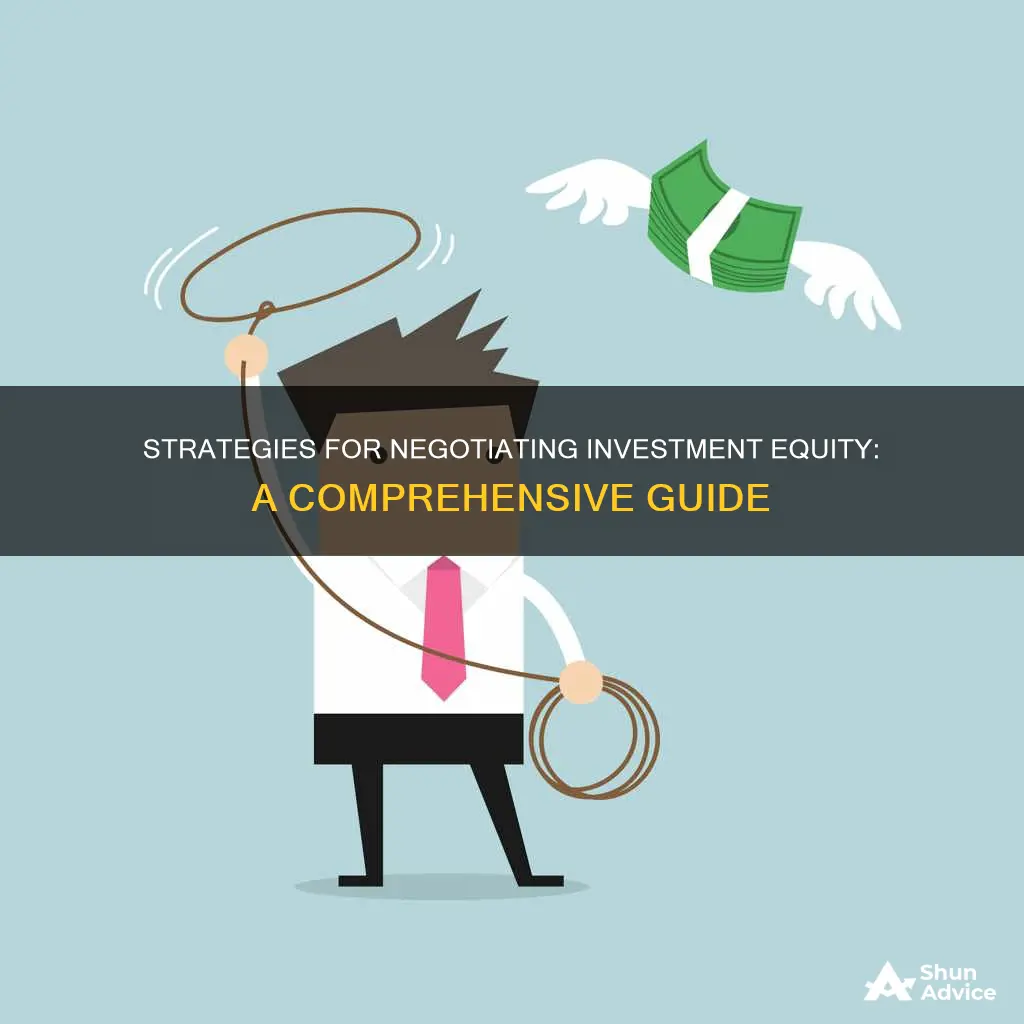
Negotiating investment equity is an important skill for anyone looking to grow their business or secure a job offer. Whether you're an entrepreneur seeking funding from investors or an employee negotiating a compensation package with equity, there are several key strategies to keep in mind. Firstly, it's crucial to understand the value of your business or your skills in the job market. This involves researching similar companies or job roles to assess the worth of your offer. Knowing your investor or employer is also essential, as it helps tailor your negotiation strategy to their specific needs and expectations. When negotiating, it's important to remain professional, flexible, and open-minded. All terms and conditions are typically negotiable, so focus on finding a mutually beneficial middle ground. Additionally, don't be afraid to seek legal or financial advice to ensure you fully understand the agreement and potential risks.
What You'll Learn

Research the company and its financial potential
Researching the company and its financial potential is a crucial step when negotiating investment equity. Here are some detailed tips to help you through this process:
Firstly, ask your prospective employer to share the company's business plan. This document should outline their business goals, strategies, and timelines. Understanding these aspects will give you valuable insights into the company's vision and potential for success. It is also beneficial to research the founders and managers, especially their track record in building successful startups. If the current venture is their first startup, look into whether they have advisors on board who can guide them effectively.
Next, consider the company's financial aspects, including the types of investors (such as banks or venture capitalists) and the amount of financing they have secured. It is also important to assess the company's "runway," which refers to how long the company can sustain its operations with its current financing. This information will help you gauge the financial health and longevity of the startup.
Additionally, research similar companies and compensation packages for comparable job roles. This will give you a benchmark to compare your equity offer. Try to focus on startups rather than large corporations, as they tend to have more flexible equity structures. You can also look up salary information for visa holders, as some countries require companies to disclose the salaries of their international employees, providing valuable data for your negotiation.
Lastly, carefully evaluate the terms of the equity offer. Calculate the value of the equity using mathematical models, considering whether it is presented as a percentage or a fixed number of shares. Understand the vesting schedule and how it aligns with your career plans, as vesting involves receiving your stocks incrementally over time. Also, be mindful of potential dilution if your equity is represented as a percentage, as it may be impacted by future stock purchases by other investors.
Marie Curie's Family Savings: Lost Investment, Found Legacy
You may want to see also

Understand the equity offer and its terms
Understanding the equity offer and its terms is a critical aspect of negotiating investment equity. Here are some key considerations to help you navigate this process:
Know the Basics of Equity
Equity represents the value of stock shares in a company. When you are offered equity as part of your compensation package, it means you are being given partial ownership in the company you work for. This can be a lucrative opportunity, especially if the company is a startup that grows significantly over time.
Evaluate the Type of Equity Offered
Different types of equity have different tax implications and portability. Common types include incentive stock options, non-qualified stock options, restricted stock, and restricted stock units (RSUs). Understand the specifics of each type to make an informed decision.
Understand Vesting Schedules
Vesting schedules determine when you will receive your equity. It could be a four-year monthly vest, where you receive your equity in increments over time. Be mindful of any cliffs, which are buffers at the beginning of your tenure when vesting is suspended.
Calculate the Equity's Worth
Determine whether the equity is presented as a percentage or a number of shares. You can then use a mathematical equity model to calculate its value. This will help you assess the financial impact of the offer.
Consider Dilution
If your equity is offered as a certain number of shares, you will own that specific number. However, if it is presented as a percentage, future stock purchases by other investors may dilute your equity in the company.
Evaluate the Company's Financial Position
Understanding the company's financial health is crucial. Assess their runway, which is how long they can operate with current funding. Also, consider their investors, financing amount, and revenue projections. This information will help you gauge the company's ability to offer cash versus equity compensation.
Ask Clarifying Questions
Don't hesitate to ask questions about the equity offer. Inquire about the percentage of ownership, the set of shares used to calculate that percentage, convertible securities, the company's valuation during the last funding round, and any expected dilution. This demonstrates your engagement and helps you make an informed decision.
Seek Professional Advice
Consult an accountant or a lawyer to help you interpret the offer. An accountant can assist in evaluating the company's financial potential and the tax implications of your equity offer. A lawyer can advise on any limitations or restrictions associated with the stock options.
Apple's India Investment: What's the Deal?
You may want to see also

Negotiate with multiple investors
Negotiating with multiple investors can be a complex process, but there are several strategies you can use to navigate it successfully. Here are some key points to keep in mind:
- Understand your investors' interests and motivations: Before entering negotiations, take time to understand each investor's goals and expectations. This will help you tailor your approach and identify areas of compromise. Ask yourself: What do their previous deals look like? What is their budget? What motivates them? What attracted them to your company? What is their future vision for your company?
- Prioritize your objectives: Determine your non-negotiable terms and prioritize your objectives. Know what you are willing to compromise on and what you cannot afford to give up.
- Establish clear communication: Set up regular communication channels with all investors involved. This ensures everyone is on the same page and prevents misunderstandings. Use these channels to address concerns, gather feedback, and keep investors informed about the negotiation process.
- Conduct due diligence: Conduct a comprehensive analysis of each investor's background, track record, and financial position. This will help you evaluate their credibility and potential risks, enabling more informed decisions during negotiations.
- Leverage your strengths: If multiple investors are interested in your business, use this to your advantage. It shows you have options and increases your negotiating power. Be transparent about your business's vulnerabilities to build trust and gain respect.
- Be flexible and open to compromise: Negotiation involves give and take. Be prepared to make concessions to reach a mutually beneficial agreement. Flexibility demonstrates your willingness to collaborate.
- Document the agreed-upon terms: Once an agreement is reached, ensure all investors review and sign a legally binding agreement. This provides clarity and prevents ambiguity in the future.
- Remain professional: No matter how heated the negotiations become, maintain professionalism. Investors expect business owners to seek favourable terms, but they will not tolerate rudeness or disrespect. Be assertive and confident when stating your requirements. Remember, how you handle the negotiation process indicates how you will manage challenges when running your business.
CalSTRS Pension2: A Look at Their Investment Portfolio
You may want to see also

Be mindful of the investor-entrepreneur relationship
Negotiating investment equity is a complex process that requires a good understanding of the investor-entrepreneur relationship. Here are some detailed pointers to help guide you through this process:
Understand the Dynamics of the Investor-Entrepreneur Relationship:
Firstly, recognise that investors are not enemies but potential partners. Their success is tied to your company's success, so negotiations should be approached from a place of collaboration rather than conflict. Building trust is essential, and investors expect you to advocate for your interests while also being open to compromise. Remember, once an agreement is reached, deviating from it can hurt your relationship and future negotiations.
Leverage Your Strengths:
Building a healthy relationship with investors doesn't mean conceding to all their demands. It's crucial to advocate for your company's interests and leverage your strengths. If multiple investors are interested, use this as an indication of your value and to showcase that you have options. If you don't have multiple investors, focus on other assets or arguments that support your position. For example, explain how the proposed terms could impact your employees and the company's growth trajectory.
Keep an Open Mind:
Being too rigid in your negotiations can stall the process. While you shouldn't compromise on essential aspects, consider if there are alternative ways to achieve the same outcome or if there are other terms you can be flexible with. Showing a willingness to find common ground is more favourable than being perceived as inflexible, which can harm your relationship with future business partners.
Effective Communication:
Miscommunication can lead to suspicion and misunderstandings. To prevent this, summarise key terms and decisions at the end of each discussion. Ensure you're on the same page by asking clarifying questions and don't hesitate to revisit points you didn't fully grasp. It's better to address any discrepancies early on rather than let them become obstacles later in the process.
Due Diligence:
Before entering negotiations, conduct thorough research on the investors. Understand their motivations, restrictions, and what they hope to gain from the investment. This information will help you tailor your pitch and address their specific interests. Remember, negotiations are a two-way street, and showing a sincere interest in their objectives can lead to a more mutually beneficial outcome.
Long-Term Vision:
When determining an investor's stake in your company, consider the long-term progression of your business. While an investor may provide initial capital, will they contribute to the growth and scale of the company in the years to come? These are critical questions to ponder before finalising any agreements.
Indian Equities: Why Now is the Time to Invest
You may want to see also

Prioritise your needs and wants
When negotiating investment equity, it is important to prioritise your needs and wants. This means understanding your personal financial situation, life stage, and goals. Are you more focused on short-term or long-term gains? Do you need cash compensation now, or can you afford to take a risk with stock options? For example, if you have financial dependents, you may prioritise job stability and immediate cash compensation over stock options that may pay off further down the line.
It is also crucial to consider what you are leaving behind by negotiating investment equity. Take stock of your current situation and quantify the value of what you have, including unvested stock options, equity compensation, salary, vacation time, and other benefits. Understand your leverage in the negotiation. Are you currently employed? Were you recruited for this position, or did you apply? Do you have a unique skill set that is in high demand? All these factors will impact your negotiating power.
Additionally, it is important to assess the company's financial position and expected timeline to liquidity. How likely is it that the company will succeed and provide a return on your investment? What is the company's anticipated path—M&A, IPO, or private equity? This information will help you determine if the investment equity is worth pursuing and how much risk you are willing to take.
Finally, don't be afraid to seek legal help. Working with an employment attorney can help you understand the legal terms and potential pitfalls of the agreement. They can also provide valuable insights into the equity side of the offer and ensure you make informed decisions about your investment equity negotiations.
Warren Buffett's Private Equity Investment Strategy Explored
You may want to see also
Frequently asked questions
Equity negotiation is a discussion between a prospective employee and a company about the employee's stock options. When you have equity in a company, you own a percentage of the company in stock.
The more equity you have with a company, the more you gain profit when they do. Having equity in a company can help you build long-term wealth, but it can also create complications relative to cash compensation.
The best time for negotiating equity is after you've received a job offer but before you've accepted the offer. This is because you can negotiate equity as part of your larger offered job compensation package, which may include your salary, job title, paid time off, and other benefits.







